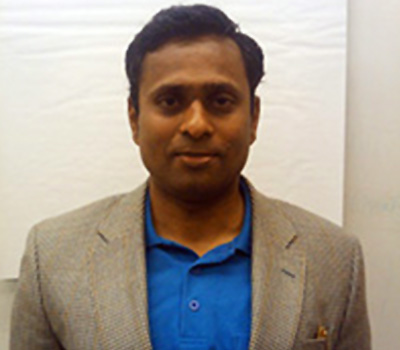Algorithms make systems plug and play, slash costs
Dr. Kartik Ariyur, of Purdue University, works to extend the benefits of decreasing costs and increasing performance available in digital electronics to a variety of systems through distributing automated data collection and decision making in these systems. In order to do so, he and his students collaboratively integrate information from multiple disciplines with mathematical rigor to avoid replacing knowledge gaps with speculation. Recent results that impact our everyday lives include means to reduce the cost of monitoring aircraft health and performance, increasing the energy efficiency of hydraulic machines, and a sun sensor for navigation that could complement GPS.
Current research includes:
- Navigation for Cell Phones: Dr. Ariyur is working to crowdsource magnetic navigation for cell phones to enable inexpensive indoor geolocation without GPS. He and his team have already obtained 20cm positioning accuracy for indoor geolocation of cell users.
- Detecting Traffic: Dr. Ariyur hopes to detect and track traffic precisely with real-time LiDAR data in order to make precise safety evaluations possible for various types of locations without long term accident data.
- Water Policy: Dr. Ariyur's team is using big data to inform and drive equitable water policy. Through using quantitative hydrological and social data, and the feedback between policies and data, this research promises to bring strategic consistency to policy making, and lay the foundations for quantitative prediction in the social sciences.
- Navigation for Space Vehicles: Dr. Ariyur is involved in constructing a navigation system for space vehicles that requires inexpensive cameras and uses only the stars. Dr. Ariyur and his collaborators have already made significant breakthroughs and are now working to quantify the effect of sensor uncertainty on overall navigation performance.
Bio
As a child, Dr. Ariyur recognized mathematics was a discipline that could contain all other communicable disciplines because all measurement is a form of counting. When he used to ask his parents who makes the automobiles, the roads, the airplanes, the buildings, or appliances--the answer was always an engineer. He therefore deduced that it was the profession that increased our security and comfort. After finishing high school, he joined the Mechanical Engineering program in IIT Madras for its old German engineering curriculum. As a junior undergraduate, he was drawn to feedback control systems as they are ubiquitous - in engineering, in biology, and in society. Dr. Ariyur therefore did his Ph.D. in control systems so he could learn to integrate more disciplines with greater rigor to solve a greater range of practical problems. As a researcher in the Honeywell Labs, he worked with various parts of the company, though he was employed by the Aerospace arm, solving a variety of problems, resulting in a large number of patents/products in worldwide use. Dr. Ariyur moved to the academic world in the hope that there would be a better environment for solving problems whose solutions would benefit society as the corporate culture had begun to decay. Website: https://engineering.purdue.edu/~kariyur/ Dr. Ariyur has several patents in process (>15) and 17 granted. These underlie several products in the world market for several years. Applications: http://appft.uspto.gov/netacgi/nph-Parser?Sect1=PTO2&Sect2=HITOFF&p=1&u=... Granted: http://patft.uspto.gov/netacgi/nph-Parser?Sect1=PTO2&Sect2=HITOFF&p=1&u=......


